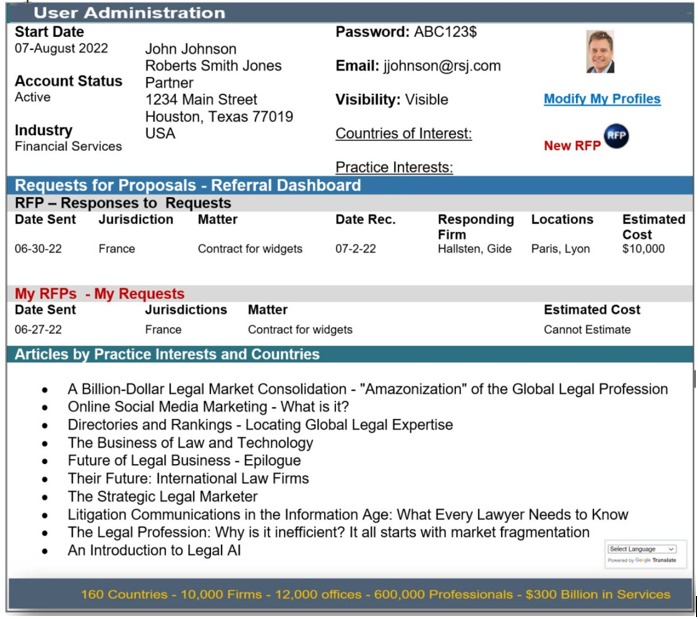Kevin O’Keefe CEO, LexBlog
Kevin O’Keefe is the founder and CEO of LexBlog, a blog devoted to helping legal professionals establish networks, build online visibility, and create organic interactions via their respective contributions. In addition to LexBlog, Kevin also founded Prairie Group Trial Lawyers, a virtual law group, after a 17-year tenure as a practicing attorney. He has a B.B.A. and a J.D., and has spent almost 20 years serving as a board member on two Wisconsin area banks. Kevin’s grassroots approach to legal networking is the reason why LexBlog is one of the largest legal blogs in the world.
________________________________________________________________
Blogging: Networking Through the Internet to Build a Reputation and
Relationships
Good lawyers get their best work via relationships and word of mouth — always have and always will. The Internet has not changed this.
Blogging accelerates a legal professional’s relationships and reputation. What may have taken a lawyer 15 or 20 years to accomplish in professional and business development is being accomplished by good lawyers, through blogging, in two or three years.\
Take attorney Peter Mahler of Farrell Fritz, a mid-sized New York-based general practice law firm. He generates 100 percent of his business from relationships he has built through blogging. Mahler’s New York Business Divorce blog,[1] which focuses on business dissolution matters, has enabled him to build a national reputation and referral base that allows him to work on sophisticated matters with high-quality clients.
Here are just four reasons why you should consider blogging.
● Nearly 60 percent of a typical B2B purchasing decision is made before even having a conversation with the provider.[2]
● Your future clients are Googling you. Seventy-eight percent of executive-level buyers go online to look for legal counsel.[3] What are they seeing?
● Your competition is blogging. Attorneys from AmLaw 200 U.S. firms publish more than 750 blogs. In-house counsel are blogging and contributing to online publications.
● Be more profitable. Online business development is efficient and productive. The greater the proportion of work generated online at professional services firms, the greater their profitability.
Lawyers do not blog for visibility per se. If getting seen, alone, were the goal, every lawyer would have his or her face on billboards and in magazines. Visibility means something more for good lawyers. What do people discover about you and your reputation when they ask around?
Online, people are looking for your insight and commentary, how other leaders in your field cite and share what you are saying, how reporters are quoting you, and at which conferences you are speaking.
Your law blog delivers this form of visibility.
Blogging is more than writing content. It requires a strategy. You begin with the end in mind.
How Do You Develop a Blog Strategy?
You need not have everything resolved in advance. On some things, you develop a feel as you go — but here are a few considerations as you start.
● Identify your passion. If you’re not passionate about an area of the law or business, what could you be passionate about? Blogging can be hard at times; make sure it’s an area you enjoy and can get excited about. It may be privacy and cybersecurity law. It may be probate litigation in Florida. We’re all different, but in blogging, a lot of the finer points on strategy come naturally to those with passion.
● What area do you want to excel in and be known for? What type of clients do you want to work for? Be aspirational, throw your heart over the bar, and let your body follow. If lawyers are developing local, national, and international reputations as a result of blogging, why not you? Want to be the go-to lawyer for immigration issues for international professional basketball players? Blog.
● Focus on a niche. Broadly focused blogs are more challenging. People do not follow blogs covering multiple areas of the law; they look for the “go-to” publication on a niche. Niche blogs get cited and shared more often. Their authors are more likely to be quoted by the media. Niches do not restrict your practice; niches open doors. “Niches lead to riches” is a worn cliché, but some things are a cliché for a reason. Here are a few examples of those who have done it right:
○ CommLawBlog5 is regularly read by not only in-house counsel, but also by the FCC;
○ Canna Law Blog puts a Seattle law firm and young lawyer on the national stage in the burgeoning cannabis industry;
○ New Miami Blog7 puts an innovative general practice law firm square and center in the Miami business community; and
○ Connecticut Employment Law Blog8 has made a Hartford lawyer a household name for HR executives both state- and nationwide.
● Identify your audience. Clients, prospective clients, and referral sources are the obvious audience, but they are not the most important. Think about the people and organizations that influence this core audience: mainstream and trade media, bloggers, association leaders, influencers on social media, publishers, and conference coordinators.
● Who do you want to know that you exist? Who do you want to know personally that you don’t now? Engage the influencers, and you’ll grow your influence as they engage you in various ways in return. Unlike offline engagement, online engagement leaves a permanent record. When Googling your name or participating on social media, your core audience will see you cited by bloggers and the media, see your blog posts getting shared, and see you speaking at conferences.
Measuring Success
It's
not primarily traffic, search engine results, and subscribers.
Ask yourself, “Am I growing my relationship network?” “Am I becoming a better lawyer?” “Am I establishing a reputation as a ‘go-to’ attorney in my niche or locale?” “Am I procuring not just any work, but high-quality clients?”
Chicago attorney R. David Donoghue of Holland & Knight is an example of the strategy, passion, and niche focus that makes for a successful blogger.
Working as an attorney for an auto supply company in Detroit, Donoghue wanted something more. As a young attorney, Donoghue didn’t think he was seasoned enough to be recognized as a thought-leader, but discovering that one of the most popular legal blogs at the time was written by a smart, second-year associate, he figured he was just as capable.
Donoghue instinctively knew he needed a narrow focus for his blog to stand out. “I knew that I couldn’t be a generalist; that no one was going to come to me for news he or she could get in The New York Times. I wanted to create the kind of content readers couldn’t get anywhere else.”
Six months after starting his blog, Donoghue walked into an IP-related legal function in Chicago, and people knew him. “This was a big deal — to have this kind of recognition as a relatively young lawyer in a big city. Because of my blog, I stood out.” Donoghue has gone on to earn millions because of his Chicago IP Litigation9 blog and now launched a second blog, Retail Patent Litigation.10
As you move ahead, here are tips to make your blogging experience more worthwhile:
1.) Listen to What’s Happening in the World Around You
Blogging involves authentic audience engagement that requires you to listen (read) first and then talk (write) later.
For most bloggers, advanced listening tools are integral. You can set up listening tools to follow influential bloggers, reporters, and news publications. In addition to these sources, follow subjects relevant to your niche. The listening tools of choice for lawyers are Feedly, a popular news aggregator, and Twitter.
Reference and share what you have read while providing your own insight and commentary. More important than simply covering legal updates, joining the “conversation” and demonstrating that you are tracking developments grows influence and a following.
2.) Write to the Medium
This is a blog, not a legal alert, corporate whitepaper, or newsletter. The best law bloggers write conversationally and with personality.
Write on general news and apply it to your niche. For example, if a hurricane is hitting the Gulf Coast, write about how HR professionals should treat those missed workdays. With the Apple iWatch and other wearable tech, how does that stand to impact privacy issues? Unlike writing on the latest legislation, litigation, and regulation, the opportunities are limitless.
Proper formatting is important. Avoid long block paragraphs. People scan on the web, so use short paragraphs — one to three sentences long — and bullets as appropriate. Use block quotes to make sources stand out. Use subheads to break up sections. Don’t worry about an exact word count, but a post as brief as 300 to 500 words may be appropriate.
Use images for every post. It’s low-hanging fruit that many lawyers miss, but images show personality and subtly add a great deal of visual appeal. Posts without images are less attractive on social media such as Facebook, Twitter, and LinkedIn. Such posts are also less likely to be shared on social media.
Keep titles short (65 characters) but descriptive. Your titles determine how your posts get indexed on Google and how they are displayed in news aggregators. Do not pack your titles with keywords; just make sure they describe what you’ve written. Short, professional, and enticing titles get shared on social media.
3.) Be Proactive
Too many lawyers get tunnel vision when it comes to blogging, only reacting to the latest legal tidbits. Merely reporting on litigation, legislation, regulations, and narrow news stories in a reactive fashion won't cut it; you need to add value. Readers want to know what’s inside your head. What’s your take? What’s it mean for them? What’s coming next?
Depending on your niche and firm, being an advocate can work well. Immigration, food safety, employment, privacy, cruise, medical malpractice, IP litigation, and divorce lawyers have developed large followings because they take stands on issues that matter to their clients. They champion the cause of the people they want to represent. Lawyers who take a stand will be surprised at their ability to instill change.
If you are not going to engage in other ways, answer questions from clients and prospective clients. For every person with that question, there are hundreds of people asking the same question. It’s essential to respect attorney-client privilege, but answering questions shows that you’re listening and that you care. You will build trust, and people asking these questions on search will discover you on Google.
4.) Think About Your Audience
Effective posts are written with an audience in mind, even an audience of one. Make up that one person in your mind when you start to blog. Talk with them as a late-night talk radio host might, or as you might describe a newsworthy item to your neighbor.
Who do you want to know you exist? With whom do you want to build a relationship? What groups or industries do you want an in with? Talk with them. Blogs are a great excuse to make an introduction — sometimes even with something as deliberate as an email interview.
If you reach one person and they share your insight with their peers, you’ve reached a highly targeted, and potentially influential, audience.
When citing a blogger, reporter, or industry leader, follow up with a soft touch. “As a courtesy to you, I wanted you to know I referenced your post/story in a piece I shared with the readers of my blog (sharing a link to your post). Keep up the great work.”
You’ll get a “thank you.” You’ll get an opportunity to connect on LinkedIn. You’ll get an opportunity to meet. How many of your competitors are meeting reporters of the local business journal or an executive or general counsel with a prospective client corporation for lunch as a result of something they wrote?
5.) Get the Right Setup
Some lawyers like to tinker, others do not. If you are not the tinkering type, get a professional’s help and ongoing coaching and support. Though WordPress is theoretically free, so is rewiring your house.
A key point that lawyers sometimes avoid: A blog belongs on a site independent of your website. Blogs complement a law firm website.
You don’t want to put a blog inside a website, but there are ways to make them complement each other: similar colors, a blog title, firm branding in the design of the blog being “published by the law firm,” and strategic linking back to the law firm website and lawyer bios.
A blog on your website will be viewed as a marketing and advertising effort, no matter what you say or do. You will forfeit the mantle of expertise that an independent publication provides you. You will be limited in how you can use your blog for strategic engagement. In-house counsel do not publish guest posts on a website, yet they do them on an independent blog.
Blog posts on an independent site from your website on an independent domain get cited by reporters and other bloggers, shared on social media, and are viewed as more credible than posts on a website. You’ll still get the attention and traffic you may be looking for.
Many solo lawyers and small firm lawyers with focused practices use a blog exclusively and forgo a website altogether. Who they are, what they do, and how to contact them are all set out on separate pages on the blog, just like on a website.
Design and develop for mobile first, desktop second. A mobile-optimized blog, preferably with a responsive design, is critical today. People, especially influencers, are consuming and sharing content on tablets and smartphones. A responsive design ensures that content looks right on all of them. A responsive design is also important for Google.
Content distribution has moved beyond email and Google searches. Law blog posts, just like articles from The New York Times or The Wall Street Journal, are distributed socially via Twitter, Facebook, and LinkedIn. Social media is bigger on mobile than on non-mobile devices.
SSL, a standard protocol for ensuring that all data transmitted between the web server and browser remains encrypted, should also be deployed on your blog site. SSL is important for establishing trust, and ranking, with Google.
A simple and professional design with an eye toward publishing is key. A blog is not the time to have neon, large logos, lawyer pictures, and other bells and whistles. Design with the reader, on a smart-phone, in mind.
6.) Use Social Media
As of 2017, daily social media usage of global internet users amounted to 135 minutes per day, up from 126 daily minutes in the previous year.
Social media, whether it be Twitter, Facebook, or LinkedIn, is where people are spending significant time. Users of these three mediums tend to be older, highly educated, and more affluent.
Taking your blog to social media — to the people — is as critical to your success as it is for a reporter in well-known newspapers to take their stories to social media.
Social media is learned through trial and error. Legal professionals should focus on the major three — Facebook, Twitter, and LinkedIn. It may take a year or more to become effective and comfortable on social media. Begin with one at a time.
On Facebook, share your blog posts (in their entirety or in an excerpt) from your personal account, not your law firm’s account. Facebook’s algorithms will determine which of your posts are displayed on the newsfeeds of your Facebook friends. Facebook users see what is of value and relevant to them, they do not see every post shared by friends.
Facebook will work best for you if you are building a network of personal and professional friends and engaging (sharing other stories, liking, and commenting) regularly.
You will of course want to share your posts on Twitter. But it’s most important that you liberally share other people’s stories and posts. Not only will you establish yourself as a well-read authority on your niche, but you'll be seen as someone who “gives” more than they ask in return. Feedly makes this easy.
Include the Twitter handle of the people whose stories and posts you tweet. This way they’ll see that you have shared their work on Twitter. Relationships and followers ensue.
When sharing your blog posts on Twitter, give a “hat tip” to the subject of your post and to any blogger or reporter whose story you may have quoted. They’ll appreciate the coverage and your reputation will grow. A hat tip is given by merely penning “h/t @kevinokeefe” at the end of your tweet following the url.
LinkedIn is a growing as a social network for legal bloggers. Share your blog posts in the status update with a brief summary of your post. Your posts will then appear in the LinkedIn feed of users. Again, algorithms will determine what gets seen and by whom.
Look for the professionals who like and comment on your posts. Engage these professionals as appropriate. Some you may wish to connect with on LinkedIn. Others you may ask to get together for lunch or coffee.
Look at your blog not as the end game. Content is the currency by which relationships and a reputation are built. Social media enables you to use your blog to build relationships and a reputation.
Done right, blogging is the great equalizer for lawyers who have not had their day in the sun — yet. Rather than using the Internet as a broadcast medium, blogging enables good lawyers to develop a business the old-fashioned way: through relationships and a word-of-mouth reputation.
________________________
[1] Peter Mahler, NEW YORK BUSINESS DIVORCE BLOG, http://www.nybusinessdivorce.com. [2] Brent Adamson, et al, The End of Solution Sales, HARVARD BUS. REV. (July-August 2012), https://hbr.org/2012/07/the-end-of-solution-sales. [3] Burkey Belser, Heavy Executive Level Reliance on the Internet for Finding and Working with Professional Service Providers, GREENFIELD/BELSER (Dec. 12, 2010), http://www.greenfieldbelser.com/articles/heavy-executive-level-reliance-on-the-internet-for-finding-and-working-with- professional-service-providers. 5 COMMLAWBLOG, http://www.commlawblog.com/. 6 CANNA LAW BLOG, http://www.cannalawblog.com/. 7 BILZIN SUMBERG’S NEW MIAMI BLOG, http://www.newmiamiblog.com/. 8 CONNECTICUT EMPLOYMENT LAW BLOG, http://www.ctemploymentlawblog.com/. 9 CHICAGO IP LITIGATION, http://www.chicagoiplitigation.com/. 10 RETAIL PATENT LITIGATION, http://www.retailpatentlitigation.com/.





 Software
Software Law
Law Legal
Legal






